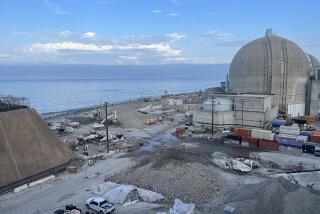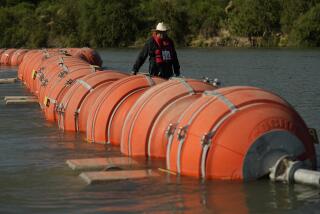Argentina Draws Line for Reactor
- Share via
An Argentine judge has banned Southern California Edison from shipping a decommissioned nuclear reactor from San Onofre within 200 miles of his nation’s coast, adding a new and risky complication to hauling the atomic refuse to a disposal site.
The ruling, the latest in a series of setbacks for the utility, could force the shipment into more treacherous waters as it passes Cape Horn, the tip of South America known for its severe weather.
Jorge Pfleger, a federal judge in Argentina, issued the order Tuesday stating that the 668-ton shipment must stay clear of the country’s ports and an exclusive economic zone, which is designed to protect marine resources up to 200 miles offshore.
Should Edison violate the order, Argentine officials say, the load will be intercepted by the military and escorted out of the nation’s territorial waters.
“If under any circumstance a ship of this type enters the economic exclusion zone, it would be violating specific orders of the Argentine justice system,” said Jorge Luis Miquelarena, a provincial prosecutor in the state of Chubut who sought the order.
Using two oceangoing tugs and a barge, Edison intends to take the reactor on a plodding 11,000-mile voyage from the Camp Pendleton Marine base in northern San Diego County to a burial site in Barnwell, S.C.
Utility officials said the load would travel more than 200 miles off South America but come into safer waters near the 12-mile international limit to sail around Cape Horn. Passing farther out increases the risk of encountering icebergs, high seas and severe winds.
The company has until March to begin the 90-day trip. Edison is still trying to arrange for a cargo terminal in the Port of Charleston to accept the reactor.
The decision is the latest snarl in the difficult and year-long effort to dispose of the old reactor. The load is considered too large to pass through the Panama Canal. It is too big to ship very far by rail, and until recently, the reactor had been too much of a security risk to enter the Port of Charleston.
Ray Golden, an Edison spokesman, said the Argentine court had not notified the utility about the order. He declined to comment on the situation, except to say that “all the necessary approvals and permitting for an international shipment have been obtained.”
Edison has been cooperating with the U.S. State Department in making arrangements for the voyage. In December, the Department of Transportation approved the move.
Greenpeace International praised Pfleger’s order, saying it was a key step in protecting the offshore environment.
“Our fear, first, is for fishing and other activities, which would come to a complete stop in case of an accident,” said Juan Carlos Villalonga, a Greenpeace official in Argentina. “This is the first thing you would notice before the impact on health and the environment, which would be long-term.”
Villalonga said the organization and Taller Ecologista, another group, petitioned the court last week in hopes of obtaining an injunction against the shipment.
Greenpeace contends that Edison has not provided Argentine authorities with a plan for recovering the reactor in case it is lost in waters deeper than 91 meters, roughly 300 feet.
Edison and the U.S. Nuclear Regulatory Commission maintain that the reactor is low-level nuclear waste and encased in a concrete coffin. It emits virtually no detectable radiation and poses no health threat, they say.
*
Weikel reported from Orange County and Tobar from Buenos Aires.
More to Read
Sign up for Essential California
The most important California stories and recommendations in your inbox every morning.
You may occasionally receive promotional content from the Los Angeles Times.












